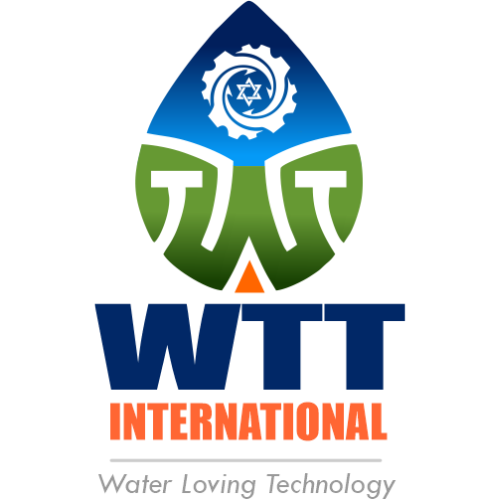Zero Liquid Discharge (ZLD) Systems for Industrial Applications
WTT International provides end-to-end engineering for Zero Liquid Discharge (ZLD) systems designed to conquer the most challenging industrial waste stream: high-salinity RO reject. Our approach integrates advanced brine concentration, high-efficiency thermal separation, and intelligent automation to maximize water recovery, minimize energy consumption, and convert waste brine into valuable resources.
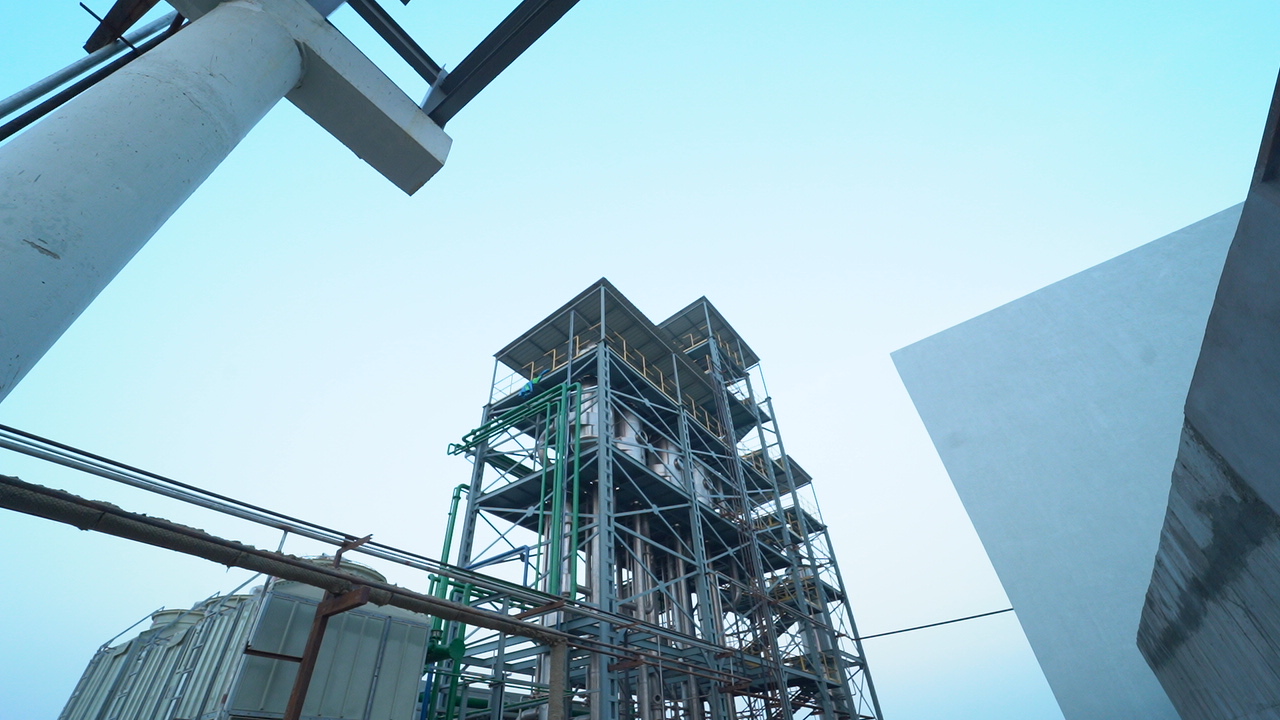
The Engineering Mandate: From Water Recovery to Zero Liquid Discharge
Achieving Zero Liquid Discharge is the final and most critical step in creating a truly closed-loop industrial water cycle. This is not a standalone process but the culmination of a sequence of advanced treatments. The journey begins with a high-performance Effluent Treatment Plant (ETP), where processes like biological treatment, ultrafiltration, and multi-stage Reverse Osmosis recover the vast majority of reusable water.
Our ZLD systems are engineered specifically to handle what remains: the concentrated, high-TDS RO reject or brine stream. The sole purpose of the ZLD plant is to manage this final, challenging effluent with maximum efficiency and reliability.
Explore our Industrial ETP solutions
Learn More About ETP SystemsKey Features of Our ZLD Solutions
Benefits for Your Industry
End-to-end engineering for Zero Liquid Discharge systems designed to conquer high-salinity RO reject
Maximize water recovery, minimize energy consumption, and convert waste brine into valuable resources
OPEX-optimized ZLD solutions that guarantee compliance and drive sustainable value
Advanced brine concentration reduces evaporator load by 30-50%
High-purity salt recovery with >99% purity for industrial reuse
Compact footprint through process intensification and vertical design
The WTT ZLD Architecture: A Symphony of Thermodynamic & Separation Technologies
Our ZLD philosophy - enhanced through a strategic alliance with a global specialist in reject-management technologies - centres on process intensification and energy minimization. Together we engineer each downstream stage to reduce hydraulic load on high-energy units, resulting in a solution that stays technically robust and economically viable throughout its lifecycle.
Core Components of the ZLD System
WTT International's ZLD systems integrate three core technologies that work in perfect harmony to achieve zero liquid discharge while maximizing energy efficiency and resource recovery. Each component is engineered to optimize the performance of the entire system.
- BrineX™: Pre-concentrates brine beyond RO limits, reducing evaporator load by 30-50%
- MVRE-MEE: Regenerative thermal loop eliminates external steam dependency
- ATFD & Crystallizers: Convert waste into valuable, marketable salt products
ZLD Core Architecture
Integrated Process Flow
Core ZLD Architecture Components
Advanced Patented brine recovery system engineered to concentrate, recover, and reuse brine with exceptional efficiency.
Multi-effect evaporator reuses steam across stages for major energy savings.
Mechanical vapor recompression recycles its own vapor heat for ultra-low power use.
Agitated thin-film dryer converts dense brine into dry, free-flowing solids in one pass.
Final cooling step that forms uniform salt crystals ready for reuse or safe disposal.

The reject stream from the ETP's RO system is first directed to our proprietary BrineX™ system. Operating beyond the osmotic limits of conventional RO, this specialized membrane process acts as a powerful pre-concentrator. It extracts additional water from the brine, elevating its concentration to 120-150 GPL.
- Operates beyond conventional RO osmotic limits
- Reduces evaporator hydraulic load by 30-50%
- Smaller, less capital-intensive evaporator required
- Permanent reduction in thermal energy consumption
The multi-effect evaporator reuses steam energy across successive stages to concentrate brine with far lower specific steam consumption than single-effect units. Each downstream "effect" operates at a lower pressure, allowing vapor from the previous stage to provide the latent heat required for evaporation.
- Cascades latent heat through 3–7 effects for up to 40% steam savings
- Handles 120–150 g/L TDS without excessive scaling when paired with BrineX™
- Modular skid design shortens installation and eases future capacity expansion
- Integrated condensate recovery lowers freshwater make-up demand
- Fully automated CIP and defoaming cycles maintain stable heat-transfer coefficients
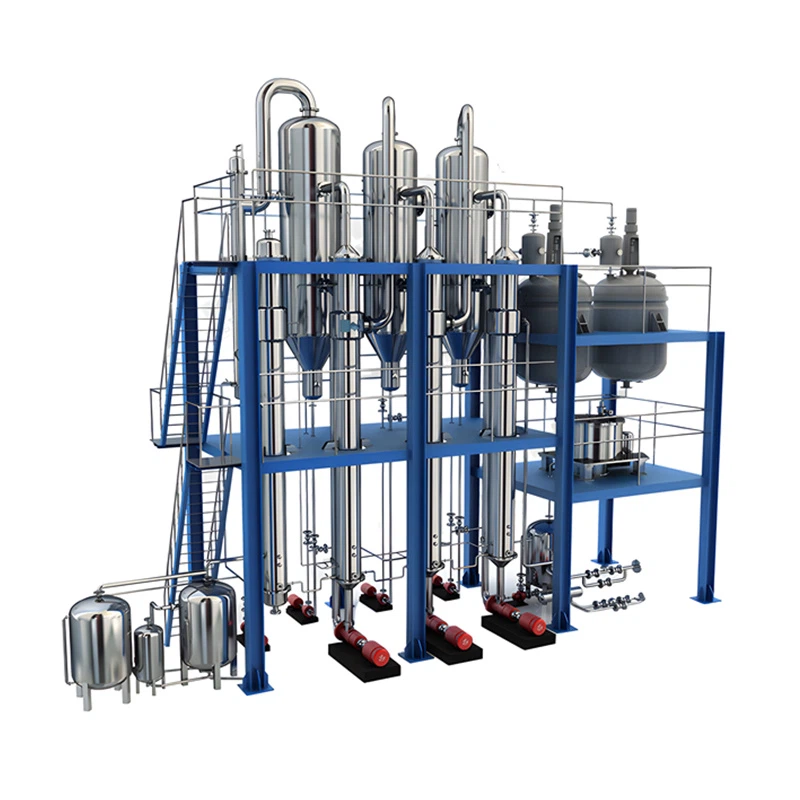
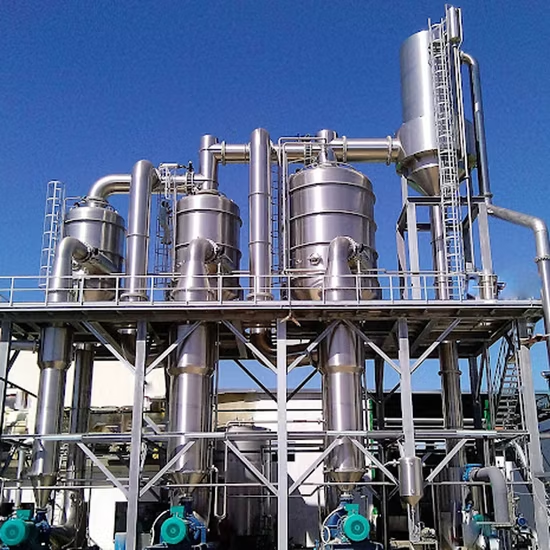
Mechanical Vapor Recompression (MVR) captures the vapor leaving the boiling brine, compresses it with a high-efficiency blower, and re-injects the vapor as the heating medium. This closed-loop approach slashes thermal energy requirements to a fraction of traditional systems.
- Achieves 10–15 kWh/m³ energy usage versus 60–80 kWh/m³ in fired evaporators
- Self-contained steam-free operation, ideal where boiler capacity is limited
- Variable-speed drives adapt compression ratio to changing feed conditions
- Built-in anti-scaling spray nozzles reduce downtime for cleaning
- Designed for remote SCADA monitoring with performance trending and alarms
The agitated thin-film dryer spreads concentrated slurry as a rotating film over a steam-heated surface. Rapid solvent flashing and intense mixing drive moisture content down to <5%, producing free-flowing powder suitable for landfill, co-processing, or reuse.
- Handles high-viscosity feeds up to 70% solids without flooding or foam-back
- Agitator flights continuously scrape fouling layers, preserving heat flux
- Short residence time (< 60 seconds) prevents thermal degradation of salts
- Optional vapour-condensing section captures residual condensate for reuse
- Skid-mounted package simplifies maintenance and future relocation
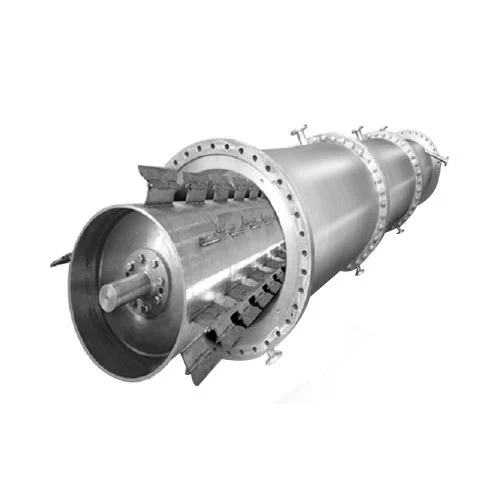
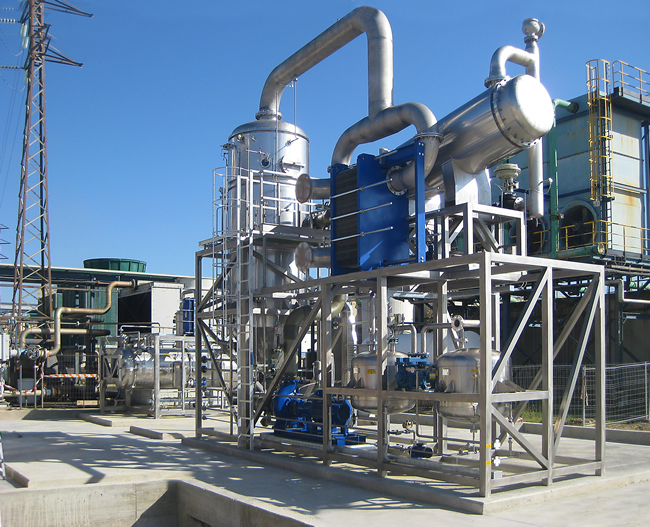
After ATFD, the crystallizer cools or evaporates the remaining liquor under controlled supersaturation to form uniform salt crystals. These crystals can be reused internally, sold as industrial by-products, or disposed of safely.
- Produces high-purity NaCl, Na₂SO₄, or mixed-salt output depending on chemistry
- Forced-circulation design prevents solids deposition in heat exchangers
- Automated crystal classification ensures consistent particle size distribution
- Captures mother liquor for re-looping, driving overall recovery to > 97%
- Optional centrifuge or belt filter integration for continuous solids discharge
The heart of our ZLD system is the Multi-Effect Evaporator (MEE), powered by Mechanical Vapor Recompression (MVR). Instead of consuming vast amounts of fresh steam, the MVR unit captures the low-pressure water vapor produced during evaporation. It then mechanically compresses this vapor, increasing its temperature and pressure.
- Captures and recompresses low-pressure water vapor
- Re-energized vapor becomes heat source for ongoing evaporation
- Regenerative thermal loop drastically cuts steam demand
- High-purity distillate ready for immediate reuse
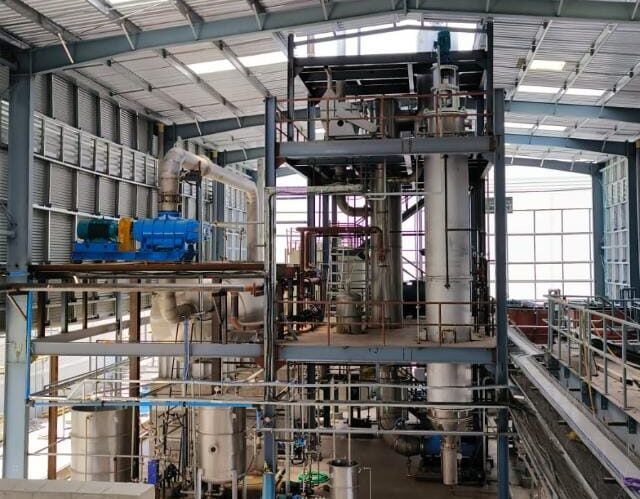
Final Solidification
Resource Valorization System
The concentrated slurry from the MEE is processed for final water removal and solids recovery. The choice of technology depends on the desired end-product. This stage not only ensures zero liquid is discharged but creates an opportunity for resource valorization.
Agitated Thin Film Dryer (ATFD)
Produces a dry, mixed-salt powder suitable for secure disposal. High-turbulence design ensures rapid and complete drying.
Forced Circulation Crystallizer
Produces high-purity, uniform salt crystals (e.g., sodium sulfate) with >99% purity for industrial reuse.
Intelligent Automation: Where Intelligence Meets Efficiency
Plants are run by advanced PLC/SCADA systems with VFDs and adaptive logic for stable, minimally supervised operation. Remote diagnostics and support through cloud-based monitoring allows for real-time trend analysis and remote troubleshooting by our expert team.
Technology Highlights (Add-On Modules)
Enhance your ZLD system with our proprietary and advanced add-on technologies.
Why WTT for ZLD: The Complete Ecosystem
Technical FAQs for ZLD Engineering
Find answers to common technical questions about our Zero Liquid Discharge solutions.
Engineer the Future of Your Facility: Sustainable, Compliant, and Profitable
Move beyond simple compliance. Partner with WTT to transform your most challenging waste stream into a cornerstone of your facility's sustainable and economic future.
